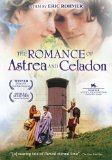| Reviews & Columns |
|
Reviews DVD TV on DVD Blu-ray 4K UHD International DVDs In Theaters Reviews by Studio Video Games Features Collector Series DVDs Easter Egg Database Interviews DVD Talk Radio Feature Articles Columns Anime Talk DVD Savant Horror DVDs The M.O.D. Squad Art House HD Talk Silent DVD
|
DVD Talk Forum |
|
|
| Resources |
|
DVD Price Search Customer Service #'s RCE Info Links |
|
Columns
|
|
|
Romance of Astrea and Celadon, The
THE MOVIE:
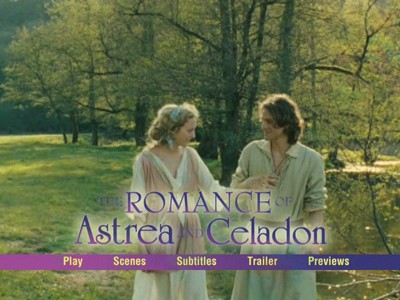
I wonder, has anyone ever asked Eric Rohmer what he thinks of the oft-quoted Gene Hackman line from Night Moves, "I saw a Rohmer film once. It was kind of like watching paint dry"? Does he laugh it off, or does it dog him around like a childhood nickname that his old schoolmates will never let him forget, regardless of how he grows up or what he does with the rest of his life? I'll admit, I had not seen an Eric Rohmer film before The Romance of Astrea and Celadon, his 2007 picture, popped up for review. I inquired with a film buddy, writer Christopher McQuain, whom I knew had more knowledge of the director and asked him if he had seen it, because I thought it looked boring. Christopher said, "They all look boring, but they really aren't. Watch it."
Well, having now watched The Romance of Astrea and Celadon, I can say that, at least as far as this film is concerned, neither Hackman nor Christopher were entirely correct. Which also means that neither were entirely wrong.
The Romance of Astrea and Celadon is an adaptation of L'Astrée by Honoré d'Urfé, a 16th-century French novel about pastoral lovers in 5th-century France. Celadon (Andy Gillet) is the son of a wealthy family, but he still works as a shepherd in order to earn an honest wage. He is in love with Astrea (Stéphanie Crayencour), the daughter of a rival family, and the feud between the two clans has made it impossible for them to be together. During a party where Celadon is cozying up to another of the village wenches as part of the pair's plan to fool their parents into thinking they have given up on one another, Astrea sees the other girl go too far and misunderstands. When she rebukes Celadon as a philanderer, he throws himself into the river, presumably drowning.
Only the fair-haired himbo doesn't die, he washes up on shore and is rescued by an aristocratic nymph (Véronique Reymond) who decides to lock the handsome shepherd in her castle and make him her own. Having eyes for no one but Astrea, Celadon desires to escape, and he finds help from the kind Léonide (Cécile Cassel). She smuggles him out, but he refuses to go home, having been forbidden by Astrea from ever crossing her eye line again. Knowing that Astrea would recant if she knew her lover were alive, Léonide and her druid uncle (Serge Renko) put a scheme into motion to bring the teenage dreamers back together.
Rohmer stays true to the conventions of the era that Astrea and Celadon comes from, maintaining an austere distance and favoring a naturalism to more colorful dramatic recreations. He stages most of the scenes as long, uninterrupted takes, and he and director of photography Diane Baratier soak up the bucolic surroundings of the French forest where they have placed the action (a title card at the start of the film apologizes for not going to the exact location of the novel, which has been touched a little too heavily by human hands in the last five centuries to serve their purpose). The movie is at its best when it is being playful, but at other times in is a little too seriously arty for its own good. Many of the actors behave stiffly, and the old-fashioned contrivances of the plot creak with age.
As with a lot of stories of this kind, the lovers tend to be the most boring characters in the picture, with the debates on love and religion undertaken by their friends and family proving more intriguing than the will-they-or-won't-they non-suspense of the main story. The big exception would be the shepherd's playboy friend, played with an annoying clownishness by Jocelyn Quivrin. His smug and childish portrayal burdens every scene he is in, like that SNL sketch from a couple of years ago where Cameron Diaz plays an extra who won't just sit in the scene and be an extra. Quivrin looks like Henry Winkler, but his acting ends up more like the Fonz has been possessed by Wilmer Valderrama. Enough with the shit-eating smirk, buddy, go back to your trailer.
So, in short, I liked some aspects of The Romance of Astrea and Celadon, and others not so much. It has a certain old-world charm that can be hard to resist at times, and fans of more reserved costume pieces will probably find themselves enjoying it more than I did. (It wouldn't be out of place on, say, "Masterpiece Theatre.") Quentin Tarantino is quoted as saying that the only way to know if you like Eric Rohmer is to watch one of his films, and "if you kind of like that one, then you should see his other ones." I kind of liked this one, so I wouldn't slam the door in Eric Rohmer's face if he came peddling his wares again; at the same time, I wouldn't put him at the top of my list, either. Consider me one of those mythical "undecided voters."
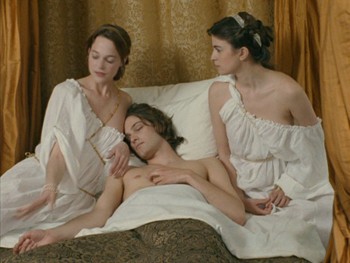
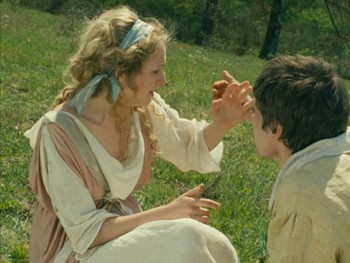
THE DVD
Video:
Assessing the quality of this Koch Lorber DVD can be a bit tricky. The overall picture quality is fairly good, with Diane Baratier's beautiful nature photography remaining intact; the picture is interlaced, however, and so you should expect to see quite a bit of combing. IMDB also reports that the aspect ratio is supposed to be 1.85:1, but I can't find anything to back that up. The DVD of Astrea and Celadon is framed at a fullscreen 1.33:1, and in all honesty, it doesn't look like an error. There never appears to be any image lost or odd cropping. It's possible that it's IMDB that is wrong.
One surprisingly persistent error in the DVD authoring is that just about every time the movie advances a chapter, it triggers a momentary pause. In some cases it's more obvious than others, but for a fraction of a second, the image freezes and the audio drops out.
Sound:
The French soundtrack is given a basic Dolby stereo mix that sounds fairly good. Outside of the pause between chapters, I heard no other hiccups. The English subtitles are yellow and nicely paced. At one point, a line did drop off the bottom of the frame, rendering it unreadable, but that was an isolated incident.
Extras:
The original theatrical trailer is included, along with a handful of other Koch Lorber trailers. The studio's catalogue is also included in the case.
FINAL THOUGHTS:
As has been stated many times, Eric Rohmer is not for everyone, and his latest, The Romance of Astrea and Celadon, is no different. The Medieval story, taken from a 16th-century novel, has some old-fashioned charms, but those same traits also make it seem a little rickety, an impression not helped much by the snooty film style. There are some fun moments, and overall the film is enjoyable enough, but given my mixed reaction and the questionable quality of the DVD, I'd say Rent It rather than buy it.
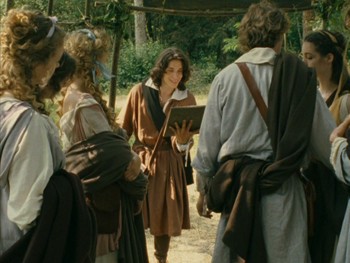
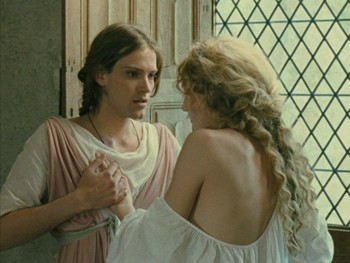
Jamie S. Rich is a novelist and comic book writer. He is best known for his collaborations with Joelle Jones, including the hardboiled crime comic book You Have Killed Me, the challenging romance 12 Reasons Why I Love Her, and the 2007 prose novel Have You Seen the Horizon Lately?, for which Jones did the cover. All three were published by Oni Press. His most recent projects include the futuristic romance A Boy and a Girl with Natalie Nourigat; Archer Coe and the Thousand Natural Shocks, a loopy crime tale drawn by Dan Christensen; and the horror miniseries Madame Frankenstein, a collaboration with Megan Levens. Follow Rich's blog at Confessions123.com.
|
| Popular Reviews |
| Sponsored Links |
|
|
| Sponsored Links |
|
|
| Release List | Reviews | Shop | Newsletter | Forum | DVD Giveaways | Blu-Ray | Advertise |
|
Copyright 2024 DVDTalk.com All Rights Reserved. Legal Info, Privacy Policy, Terms of Use,
Manage Preferences,
Your Privacy Choices | |||||||









